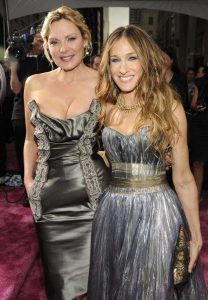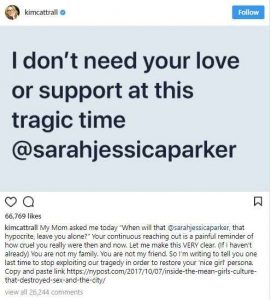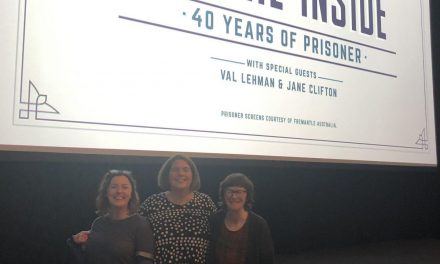Ever since Feud aired in the U.K., just in advance of the main revelations concerning Harvey Weinstein and the collective activities of the #METOO movement in Hollywood, I have been wondering about the status of that classical narrative, the female celebrity catfight, in modern times. I was arrested by the representation of the relationship of Joan Crawford and Bette Davis in this first drama series, due to be dedicated to different famous historical disagreements each time. In the hands of two accomplished, mature actresses – in Jessica Lange and Susan Sarandon – the portrayal of this decades-long battle for supremacy was delicately shaded. At several moments it touched on tragedy as well as comedy; it acknowledged the difficulties of these two women who had had to live their lives in a medium that demanded they be glamorous and grand, whilst rendering them constantly powerless. This was as apparent equally in Lange’s querulous, vodka-drinking and fragile Crawford and Sarandon’s bullish, cigaretted and booze-swilling Davis.
However, the drama itself turned on the energetic sparring of the catfight, the way in which each woman could exercise a kind of power which could be the subject of pleasure and entertainment. Their arena was the film set, the press conference and the awards ceremony and their power was in their verbal dexterity and mental wit. That their fights with each other were an extension of their fight with the system they occupied was made constantly clear. The British newspaper, The Daily Telegraph’s review had its cake and ate it on this point, with a headline stating that ‘sparks flew in this delicious tale of Hollywood misogyny.’ Stanley Tucci’s stalking horse of a Jack Warner preserved an ultimate right of veto, despite his comedic exacerbation. The verbal trade-offs between the two stars were clearly their act of power in a state of powerlessness and could be enjoyed even as the Hollywood system is indicted. The real patsy, in the context of the drama, appeared to be Alfred Molina’s Robert Aldrich, the director caught between a triumvirate of women, Crawford, Davis and eventually his patient wife. Feud went some way, but no further, with a knowing wink and acceptance of the entertainment value of Hollywood’s Babylonian excesses.[i] And it reminded us that, long before Weinstein, it was the place that spawned the phrase ‘casting couch’, the rite of entry of every new ingenue. It was, like many other contemporary scandals, hiding in plain sight.
In the need to stand up to these failures and injustices, I should own up to a momentary fear in relation to that verbal wit, that agility and public sparring. Feud took me back to The Max Factor Museum just off Hollywood Boulevard, which I visited when lucky enough to spend some time in Los Angeles. It is the story of Factor’s invention for women, including his beauty calibrator, which does resemble a medieval torture mechanism. However, alongside that fascinating history, it features many women – through their make-up boxes, personal effects, images and performances.[ii] In examining Max’s control of skin colour, there were rooms dedicated to the blonde – Marilyn of course – and the redhead – Lucille Ball, showing her TV comedy on loop as well as her lipsticks. The exhibits are presented with great care and detailed accompanying notes. In a quote attributed to Tallulah Bankhead, as directed at Bette Davis: ‘After all the nice things I’ve said about that hag. When I get hold of her, I’ll tear out every hair of her mustache.’
I know this, since I took a picture of the entire quote.[iii] It made me laugh, and I enjoyed its ‘cattiness’, the power of the ‘unruly’[iv] woman who gave rise to it. Where will that power of that wit of those women of the ‘woman’s film’ find its place now? In the important statements of many Hollywood actors recently, and their verbal commitment to their relationships to women rather than powerful men, can the verbal power be successfully redirected?
Within the public space of media reporting, it is significant how quickly a campaign that recognises women standing – and speaking – together can turn into the reporting of their differences, to look, perhaps, for the signs and signatures of a catfight; thus, weakening the challenge to a clearly misogynistic culture. Accusations of ‘unsisterliness’ greeted Catherine Deneuve’s – and ninety-eight other French women’s – response to the #metoo claims. They rejected the claims of the movement on the basis that they regard them as veering towards censorship, of needed to impose a form of morality on the artistic process.[v] Certain coverage has contextualised this as peculiarly French.
Despite my love of Tallulah and Bette, I take to heart Natalie Portman’s statement recently and Jessica Chastain’s from a long-ago Oscar race, that they will not find themselves pitted against other women. However, a further development has brought another recognition which was visible in Feud’s narrative. It is of the pain in women’s relationships, of a reminder that these are people rather than personas. Kim Cattrall, an actor I am currently writing about, and Sarah-Jessica Parker have been the subject of rumours about their relationship during and after the recording of Sex and the City and its global success as a television show and a film franchise. Outside of the discussion here are the questions about the positioning of these broadcasts, their dismissal as forms of ‘chick’ entertainment. However, there is clearly a cultural misogyny at work, one which moves the female public figure through a different kind of ‘ducking stool’[vi] ritual than that of her male counterpart. Sex and the City completed its run over ten years ago. However, on 11th February 2018, Cattrall and Parker were briefly the most read piece on the British newspaper Guardian website and was also featured on the BBC website.[vii] Commentators, such as Rachael Revesz of The Independent, mourned the loss of the film and television franchise to this feud; a flawed, privileged and non-diverse group of women characters they may have been, but they had still functioned as a rare example of a narrative driven by women’s relationships to each other. As Deborah Jermyn stated in exploring the series appeal, as a fan with other fans, its authenticity asserted since they are ‘not idealised, in the sense that they do argue, but underpinned by a deeply felt sense of mutual support’[viii]
What had caused this response was a public confirmation of what had been rumoured for several years; of a rift, a feud, between these two women, which had overshadowed further productions of the successful franchise. This was a narrative that also featured shadowy male patriarchs, in producers Darren Star (apparently ‘Team Kim’) replaced by Michael Patrick Kelly (‘Team SJP’); like Jack Warner, they add the necessary ingredient of ultimate female powerlessness to the story. When asked on the red carpet, Parker had ‘reached out’ to Cattrall following the disappearance and tragic untimely death of her brother. Via Instagram, Cattrall responded to the expressions of sympathy thanking her #sexandthecity colleagues in general. However, just a few days later, she posted a very personal, remarkable (in public terms) expression of feeling, in which she cited Parker’s ‘cruelty’ in reaching out to her and her ‘hypocrisy.’ Cattrall stated:
I don’t need your love or support at this tragic time @sarahjessica parker. My mom asked me today “When will that @sarahjessicaparker, that hypocrite, leave you alone?” Your continuous reaching out is a painful reminder of how cruel you really were then and now. Let me make this VERY clear. (If I haven’t already). You are not my family. You are not my friend. So I’m writing to tell you one last time to stop exploiting our tragedy in order to restore your ‘nice girl’ persona. Copy and paste link: cstonline.netnypost.com/2017/10/07/inside-the-mean-girls-culture-that-destroyed-sex-and-the-city/
Parker initially responded to Cattrall’s assertion that the women had not been friends, just colleagues, by stating she was ‘heartbroken’. In her direct reply, she has specifically addressed the idea of a ‘feud’ by indicating that it is significant that she has not responded publicly to Cattrall’s comments. [ix] How might we interpret these new events – at a time when women’s relationships with each other are under greater scrutiny for their potential power? Perhaps it indicates how we still love a good catfight, perhaps; certainly, the widespread media coverage that has followed, rehashing the events of the last fifteen years, suggests so. However, it is important to consider women’s battles with each other as indicating something wider, in its mediation of the women’s perceived illogicality and emotionality which may preclude them from wielding substantial power.[x]
What has struck me about this moment is not only the pain that is on show in public, SJP has been photographed, on the streets of New York, looking suitably unhappy befitting a break-up. There seems an additional difficulty of managing that pain when you are constantly asked to comment in public on the quality of your relationships with each other.[xi] Returning to the trailer for Feud today, in writing this, I find Catherine Zeta-Jones’ Olivia de Havilland deliver the line: ‘Feuds are not about hate; they’re about pain.’ As part of a historical entertainment, it may appear a throwaway observation. In the context of the #timesup and #metoo initiatives, perhaps it points to the more complex emotional labour these celebrity women are performing in public; feelings which are intertwined with structures of power and which the terms ‘catfight’ and ‘feud’ fail to honour. It also asserts, perhaps, an especially female quality, being the vital importance of authenticity and of loyalty with other women. In her personal grief and current pain, Cattrall’s statement bears witness to – reinforces – women’s importance to each other, a greater sensitivity to betrayal and hypocrisy as we negotiate the demands of patriarchy. Madeleine Albright was vilified when she pointed towards the special place in hell during the 2016 presidential election, a statement which admittedly had its own complexities in relation to the candidate. However, a public, earthly place in hell is visible in both of these stories and it reinforces the question that underlies, and informs the ending, of Feud. In its beautifully realised fantasy sequence from Joan’s perspective it asks a pertinent, contemporary question – now what might have been possible if Bette and Joan had been friends?
Rona Murray is an Associate Lecturer at Salford University (r.c.murray@salford.ac.uk) working on aspects of women’s authorship and its relationship to celebrity culture.
References:
[i] Kenneth Anger’s book, Hollywood Babylon (1975), told the scandal stories of early Hollywood. Film critic Kenneth Turan is quoted, on Fatty Arbuckle, as stating: ‘Stars still get into trouble and they still need help managing crises. At least Arbuckle didn’t have to deal with Twitter.’
[ii] It does feature all kinds of Hollywood productions, not just female-orientated ones.
[iii] I did ask permission, for this and other personal photos.
[iv] Referring to Kathleen Rowe’s concept in her book, The Unruly Woman Gender and the Genres of Laughter (1995).
[v] This calls up many of the stereotypes of French female stardom celebrity and intellectualism, which has always been perceived as a distinct version, based on a kind of association of feminine glamour with power. Ginette Vincendeau has argued in respect of Deneuve herself: ‘Arguably, these women achieved their prominent positions partly because they endorsed the accepted signs of ‘French femininity’. In this respect, the mature professional French woman’s elegance, coupled with real clout, is a sign of her being in control, rather than, as in the 1960s, of being controlled’ (2000, p.206).
[vi] This idea is taken from an article on class: ‘”Celebrity Chav”:Fame, Femininity and Social Class’: Bennett & Tyler (2010), European Journal of Cultural Studies.
[vii] It is difficult to find a feud between male co-stars that could garner media reporting all these years later. [vii] Shia la Boeuf and Charlie Sheen may provide similar ongoing tabloid fodder through various incidents. The on-set feud between George Clooney and David O’ Russell (Three Kings) seems to attract recent coverage, but is reported as differences about crew treatment, between star and auteur.
[viii] Jermyn, D. (2004) ‘In love with Sarah Jessica Parker’ in Akass & McCabe (eds), p.210.
[ix] Parker has, as we publish this blog, responded by stating there was no feud, as she did not reply to Cattrall: https://independent.ie/style/celebrity/celebrity-news/sarah-jessica-parker-breaks-her-silence-on-feud-with-kim-cattrall-36606523.html.
[x] We could speculate on its role in Donald Trump’s rise to Commander-in-Chief.
[xi] Cattrall was interviewed by Piers Morgan in October 2017 and commented on their status as ‘colleagues’ not ‘friends’.







